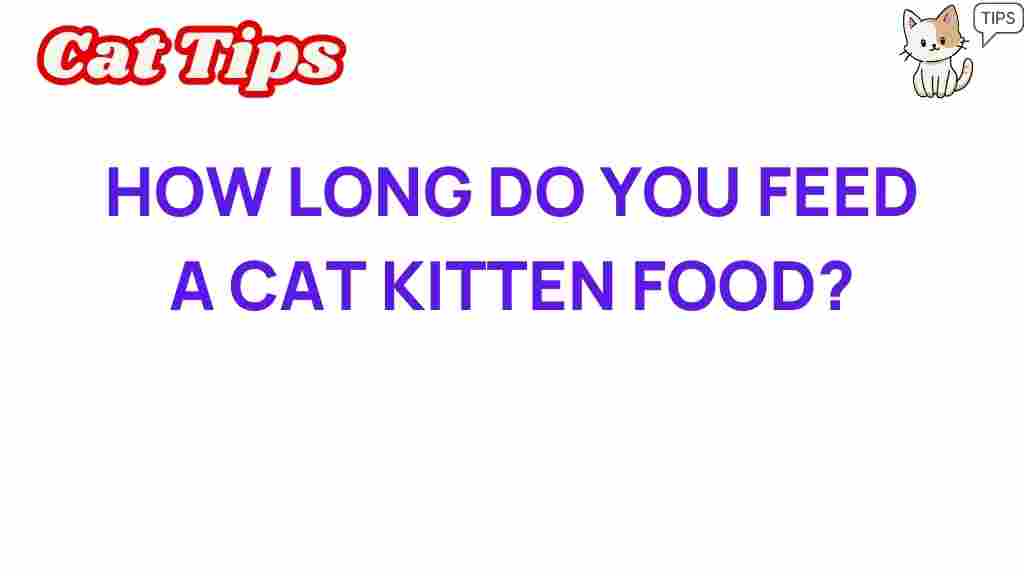The Importance of Cat Nutrition: How Long Should You Feed Your Cat Kitten Food?
As a responsible cat owner, understanding your feline friend’s dietary needs is crucial for their overall health and well-being. One common question that arises during the early stages of a cat’s life is, “How long should you feed your cat kitten food?” This article will provide a comprehensive guide on the timeline for feeding kitten food, ensuring that your cat receives the best nutrition possible during their formative years.
Understanding Cat Nutrition
Cat nutrition plays a significant role in your pet’s development and health. Kittens require specific nutrients to grow and thrive, and kitten food is formulated to meet these needs. Here are some key aspects of cat nutrition that you should consider:
- Protein: Essential for growth and muscle development.
- Fats: Important for energy and healthy skin and coat.
- Vitamins and Minerals: Necessary for various bodily functions, including bone growth and immune health.
Knowing how long to feed kitten food is crucial to ensuring your cat receives the right balance of these nutrients.
When to Start Feeding Kitten Food
Most kittens are weaned from their mother’s milk by about 8 weeks of age. At this point, they should begin transitioning to solid food. It’s essential to provide them with high-quality kitten food that meets their nutritional requirements. Here are some tips for introducing kitten food:
- Start with wet food, as it’s easier for kittens to chew and digest.
- Gradually mix in dry kitten food to help them adjust to different textures.
- Monitor their reaction to the new food and consult your vet if you notice any issues.
How Long Should Kittens Eat Kitten Food?
The general guideline is to continue feeding your cat kitten food until they reach about 12 months of age. However, several factors can influence this timeline:
- Breed: Larger breeds, such as Maine Coons, may benefit from kitten food until they are 18 months old.
- Activity Level: Active kittens may require more calories, so they might need kitten food longer than less active ones.
- Health Conditions: If your kitten has specific health issues, consult with your vet for personalized advice.
Transitioning from kitten food to adult food should be gradual to avoid digestive issues. Follow these steps:
Step-by-Step Transition Process
- Start Gradually: Mix 25% adult food with 75% kitten food for the first few days.
- Increase Adult Food: Gradually increase the proportion of adult food to 50% after a week.
- Final Transition: After another week, change to 75% adult food and 25% kitten food.
- Full Transition: By the end of the third week, your cat should be eating only adult food.
During this transition, monitor your cat’s weight and behavior. If you notice any signs of digestive distress, consider slowing down the transition process.
Troubleshooting Common Issues
Even with careful planning, you may encounter some issues when transitioning your cat from kitten food to adult food. Here are common problems and solutions:
1. Digestive Upset
If your cat experiences diarrhea or vomiting:
- Return to the previous ratio of kitten food to adult food.
- Introduce the new food more slowly.
- Ensure that the new adult food is high quality and appropriate for your cat’s age and size.
2. Picky Eater
Some cats can be finicky about their food:
- Try different brands of adult food to find one your cat enjoys.
- Mix in a small amount of wet food to entice them.
- Consider consulting your vet for recommendations on palatable options.
3. Weight Gain or Loss
Monitor your cat’s weight during the transition:
- If your cat is gaining weight, reduce the portion size.
- If your cat is losing weight, increase the portion size or consult with your vet.
Conclusion
In summary, understanding cat nutrition is vital for your kitten’s health and development. Feeding your cat kitten food until they are around 12 months old is generally recommended, though factors like breed and activity level may influence this timeline. A gradual transition to adult food is essential for preventing digestive upset, and paying attention to your cat’s preferences and health will ensure a smooth process.
If you have further questions about your cat’s dietary needs, don’t hesitate to consult your veterinarian. For more information on pet nutrition, you can visit this resource.
By providing the right nutrition at the right time, you can help your cat grow into a healthy and happy adult.
This article is in the category Nutrition and created by CatTips Team
